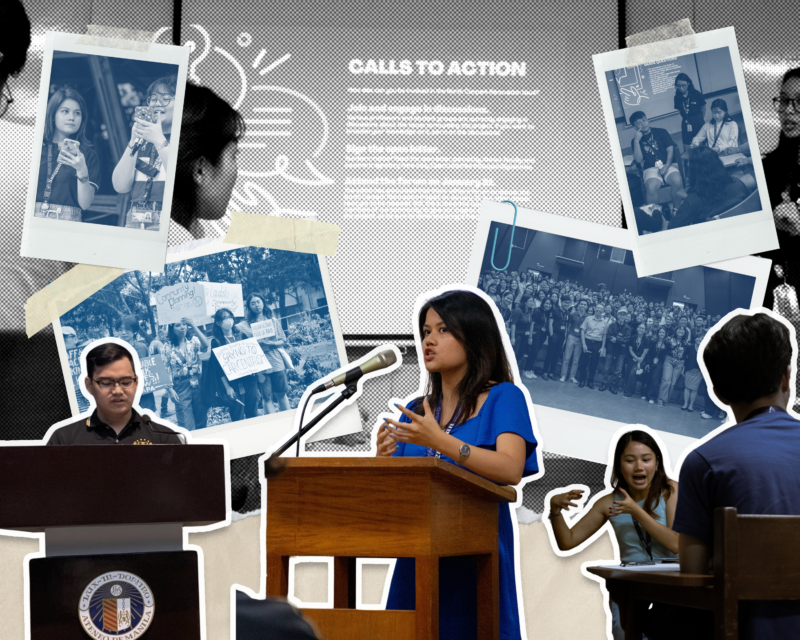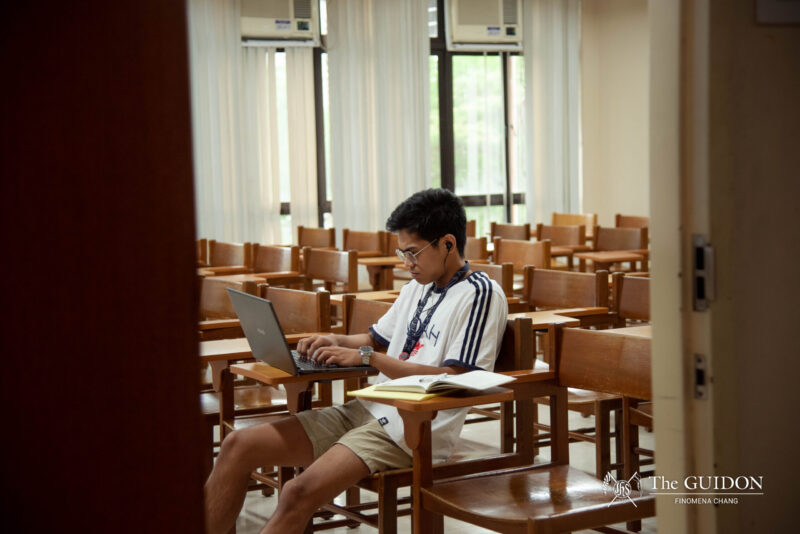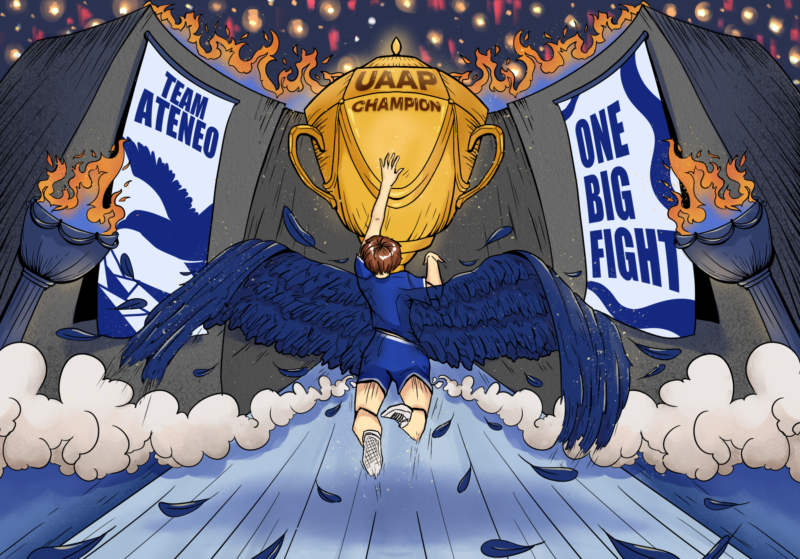The following is the full and unabridged valedictory address delivered by Jamesun Wacnang Bejarin (AB POS 2022), cum laude and valedictorian of the Ateneo de Manila University Class of 2022 during the Loyola Schools Commencement Exercises.
Hon. Maria Leonor Gerona Robredo, 14th Vice President of the Philippines; Fr. Primitivo Viray, Jr., Provincial Superior of the Philippine Province of the Society of Jesus; Ms. Bernardine Siy, Chair of the Board of Trustees; Fr. Roberto Yap, University President; members of the Board of Trustees; Dr. Maria Luz Vilches, Vice President for the Loyola Schools; vice presidents, deans, administrators, faculty and staff; sa ating mga magulang, mga kaibigan, at mga kababayang nanonood sa livestream; sa mga kapwa kong magtatapos, magandang araw po sa ating lahat (to our parents, friends, and countrymen watching the livestream; to my fellow graduates, good day to all of us)!
Every graduating batch has its own fair share of challenges. Our batch, however, had to face challenges that were extremely overwhelming: the national K to 12 reform, the new Loyola Schools core curriculum, and the global transition to pandemic learning. Our batch was the pioneer of these changes. We were used to test if these changes would actually work. Jokingly, we called ourselves “guinea pigs.”
We started college with our OrSem Tayâ—to take a chance. True enough, our experiences in the past four years have revolved around taking chances on ourselves, on our country, and on each other.
Sa pagtatayâ sa mga sarili natin, sumabay tayo sa agos ng pagbabago (By taking a chance on ourselves, we chose to run alongside the currents of change). When I stayed in the dorm in first year, I met batchmates who had to leave their provinces to study in Manila. It wasn’t easy for them to live in a new environment, but they adjusted and excelled in orgs, in acads, and in sports. As a student leader, I witnessed how we carried on despite the changes brought by COVID-19. Training alone at home, our student-athletes rediscovered their passion for sports. And they continued to compete for our school and country. Our student leaders continued to serve, even as interactions with sectors and org members had to be done online. Those among us who needed to pass our theses patiently conducted interviews and gathered data remotely. We learned to think outside the box. We finished what we had started. We survived!
Sa pagtatayâ natin sa Pilipinas, lumabas tayo sa ating nakasanayan (By taking a chance on the Philippines, we left our comfort zones). During the country’s most recent elections, many of us went beyond registering as first-time voters. We campaigned house-to-house for candidates that reflected our values, even though the odds were against us. What we lacked in machinery and resources, we made up with hard work and radical love.
At sa pagtatayâ natin sa ating kapwa, nagtayâ rin sila sa atin (And in taking a chance on others, they also took a chance on us). Many of us got by college through the kindness of others: parents and benefactors, loved ones and friends, blockmates, classmates, and orgmates who all made memories with us; teachers, formators, and personnel who supported us; and people we’ve met and have made an impact in our lives in profound ways.
However, we ought not to glorify our resilience through the difficulties of the chances we had taken. Ang totoo, marami sa atin ang napagod, nabigo, at nasaktan sa pagtatayâ (In truth, many of us got tired, fell short, and were hurt as a result of taking a chance). Many scholars needed to work part-time on top of their academic load just to make ends meet. During the pandemic, a lot of us struggled to learn, not only because of the lack of access to onsite facilities and resources for conducive online learning, but also because it was difficult to feel that we belonged to a community. Many of us may not yet have processed the sense of defeat after the previous elections. Some of us lost loved ones and opportunities and, perhaps, up to now, have still been unable to grieve.
Indeed, we can only come to terms with our past if we recognize what we truly feel. More importantly, we can only be at peace if we act upon the things that hold us back. Sa madaling salita, kailangan pa rin nating magtayâ (In simpler terms, we need to continue taking chances). But to take a chance is not to move on as if nothing happened, it is to push back as a way of moving forward.
Patuloy na pagtatayâ sa sarili
To push back is to be self-aware and critical about ourselves and the conditions we find ourselves in. When it dawns upon us that other people have it worse, some of us even dwell on how lucky we are compared to them: #SimpleJoys, #Thankful, #SoBlessed. The fact remains that we are privileged—some more than others—in a country beset by deep inequality and social exclusion.
Our very education is indicative of this. Our community takes to heart being persons with and for others, yet a lot of us live lifestyles detached from most Filipinos. This is not to say that we or the Ateneo failed to be critical of the state of our society. In the face of injustice, we have been firm about our values and principles. Marami rin naman tayong nagawa (We’ve actually done a lot)! Yet our own self-awareness and critical thought should lead us to recognize that, indeed, being privileged makes us part of the problem.
In dilemmas like this, Ateneo has taught us to discern—to weigh our options, recognize our motivations, and remember our “why.” In pursuit of magis—or what is more loving and good—we ought to translate this awareness into action as we decide what to do after college.
Patuloy na pagtatayâ sa Pilipinas
Paano ba ang magtayâ (How do we take chances)? To push back is to resist the structures that reinforce the status quo. Our struggles with stress, anxiety, and depression are by-products of systems that force us to be productive to the detriment of our well-being. That’s neoliberal capitalism for you. Kailangan ding suriin at intindihin ang desisyon ng mayorya sa ating mga kababayang iboto at ihalal bilang pangulo ang anak ng isang diktador (There is also a need to discern and understand why the majority of Filipinos voted for the son of a dictator as president). More than three decades after the return of democracy, many Filipinos still feel that their lives have not changed. As the gap has widened between the rich and the poor, more Filipinos have become marginalized and susceptible to forces that aim to distort established truths for their own gain.
Paano ba ang magtayâ sa ganitong klaseng sitwasyon (How do we take chances amid these kinds of situations)? If our problems are systemic in nature, then our approach must go beyond the individual and toward the structural. Inevitably, privilege gives us the power to influence how organizations, institutions, and movements are shaped. Let us commit ourselves to the transformation of the current way of doing things. Let us work with the marginalized and allow them to govern, even if it would mean letting go of the very privilege from which we benefit.
Patuloy na pagtatayâ sa kapwa
Kaya ba natin ang ganitong klaseng pagtatayâ? Oo, pero hindi nang mag-isa! To push back is to go beyond our circles towards broader collective action. Pagkatapos ng eleksyon, marami sa atin ang nakaramdam ng pagkabigo, hindi lang dahil parang nasayang ang ating mga itinayâ, kundi dahil hindi rin natin alam kung ano na ang susunod na gagawin. Sa pagkatalo, sino o ano na ang dahilan para lumaban tayo at magkaroon ng pag-asa?
(Are we capable of taking chances like these? Yes, but we can’t do it alone! To push back is to go beyond our circles towards broader collective action. After the election, many of us felt a sense of failure, not only because we lost that chance, but also because we did not know where to go from there. In losing, who or what are the reasons why we must continue to fight and have hope?)
Hindi nakabase sa iisang tao o iisang eleksyon ang mga pagbabagong ating minimithi kundi sa ating lahat (The changes we yearn for are not dependent on one person or one election alone but on all of us). All of us have power, given each individual’s inherent capacity to do good. However, we may often feel that the power we hold cannot make a dent in society’s problems. But imagine a future where we work together across our chosen careers—in the fields of government, medicine, media, the sciences, education, technology, development work, engineering, culture, business, and the arts, among others—in employing holistic solutions to society’s problems. Imagine the possibilities when we work with people from different walks of life and set aside our self-interests in pursuit of the common good. Each of us has the agency to make this choice.
Sa aking mga kapwa magtatapos, kaya ba nating piliing magtayâ? Para saan? Para kanino? Sama-sama tayong magtayâ para sa isang Pilipinas, kung saan tinutugunan ang mahihirap na problema gamit ang angking-galing ng bawat isa. Sama-sama tayong magtayâ para sa isang Pilipinas, kung saan hindi na espesyal ang pagtatapos sa Ateneo dahil abot-kamay na ng bawat kabataan ang de-kalidad na edukasyon sa lahat ng bahagi ng bansa. At sama-sama tayong magtayâ para sa isang Pilipinas, kung saan binibigyang espasyo ang lahat na makiambag tungo sa ating mga pinagkaisang pangarap, magkakaiba man ang pinanggalingan.
(To my fellow graduates, are we still capable of taking chances? For what? For who? Together, let us take a chance for a Philippines, where we face the difficult problems of today through the collective capabilities of each person. Let’s all take a chance for the Philippines, where it’s no longer special to graduate from the Ateneo because everyone can attain quality education in every part of our country. Let’s all take a chance for a Philippines, where everyone is afforded a space to contribute towards our collective aspirations, regardless of our differences).
Malaking karangalan po para sa akin—bilang isang Ilokano at katutubong y-Kalinga mula sa tribo ng Tulgao, Tingguian mula sa Abra, at Ifugao—na ilahad ang kuwento at mga hangarin ng Klase ng 2022 ng mga Paaralang Loyola ng Ateneo de Manila (This is a tremendous honor for me—as an Ilokano and indigenous y-Kalinga from the tribe of Tulgao, Tingguian of Abra, and Ifugao—to share the stories and hopes of the Class of 2022 of the Loyola Schools of the Ateneo de Manila). While we cannot determine what the future holds after graduation, hope lies in us choosing to take a chance on ourselves, on our country, and on each other–of pushing back as a way of moving forward.
Thank you very much and congratulations, my dear batchmates! Dios ti agngina ken matago-tago tako losan! Mabuhay tayong lahat at maraming salamat po (God bless and long live)!




